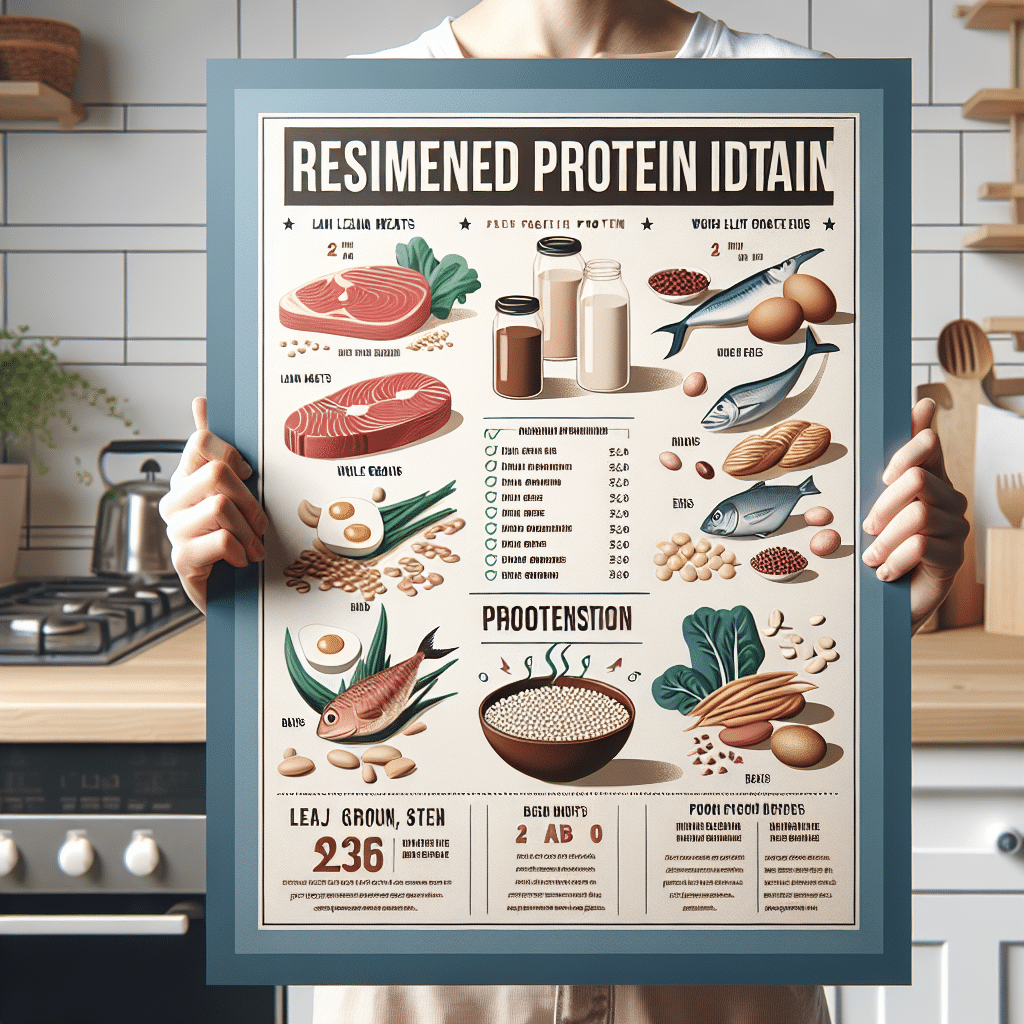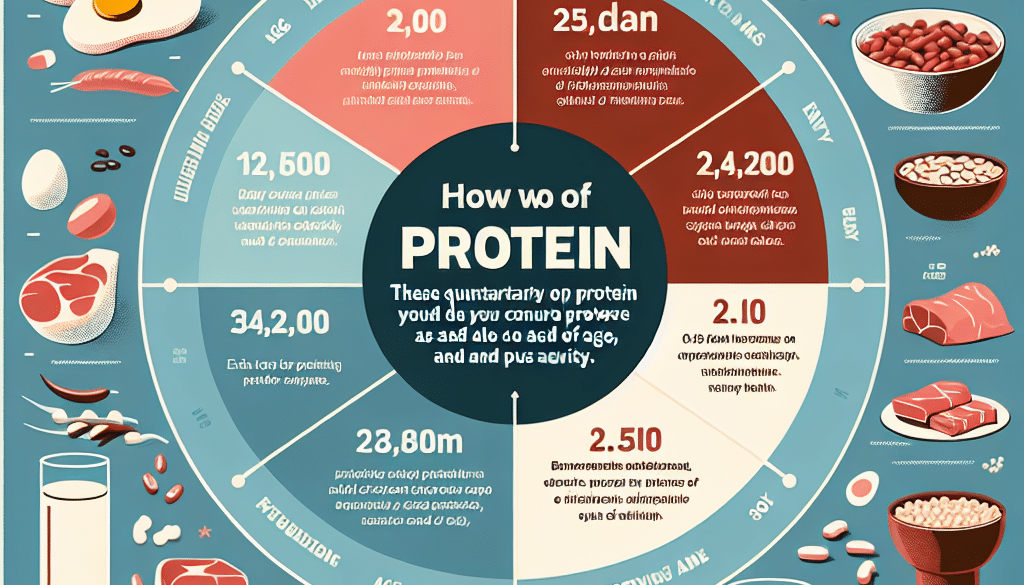How Much Protein Should I Be Eating A Day?
-
Table of Contents
- Optimal Daily Protein Intake: Your Comprehensive Guide
- Understanding Protein Requirements
- Recommended Dietary Allowance (RDA) for Protein
- Factors Influencing Protein Needs
- Protein Intake for Different Lifestyles
- Athletes and Active Individuals
- Weight Management
- Vegetarians and Vegans
- High-Quality Protein Sources
- Case Studies and Statistics
- Conclusion: Balancing Your Protein Intake
- Discover ETprotein’s High-Quality Protein Products
Optimal Daily Protein Intake: Your Comprehensive Guide

Protein is a crucial macronutrient that plays a vital role in building muscle, repairing tissue, and producing enzymes and hormones. Understanding how much protein you should consume daily is essential for maintaining good health and achieving your fitness goals. This article delves into the factors that influence protein requirements, the recommended dietary allowances, and how to meet your protein needs effectively.
Understanding Protein Requirements
Protein needs vary from person to person based on several factors, including age, sex, weight, activity level, and overall health. The Recommended Dietary Allowance (RDA) for protein is a good starting point for understanding how much protein you should be eating each day.
Recommended Dietary Allowance (RDA) for Protein
The RDA for protein is 0.8 grams per kilogram of body weight for the average adult. This means that a sedentary woman weighing 68 kg (150 lbs) should aim for about 54 grams of protein per day, while a sedentary man weighing 77 kg (170 lbs) should target around 62 grams of protein daily.
Factors Influencing Protein Needs
- Age: Older adults may need more protein to prevent muscle loss.
- Activity Level: Athletes and those with physically demanding jobs require more protein to repair and build muscle.
- Health Status: People recovering from illness or injury may have increased protein needs.
- Weight Management Goals: Higher protein intake can promote satiety and support weight loss efforts.
Protein Intake for Different Lifestyles
Different lifestyles and goals necessitate varying protein intakes. Here’s a closer look at how much protein specific groups of people should aim for:
Athletes and Active Individuals
For those who are regularly active or engage in strength training, protein needs can be significantly higher. The American College of Sports Medicine recommends 1.2 to 2.0 grams of protein per kilogram of body weight per day for athletes, depending on the intensity and frequency of their training.
Weight Management
Increasing protein intake can be beneficial for those looking to manage their weight. Studies suggest that consuming 25-30% of total daily calories from protein can enhance satiety and increase energy expenditure.
Vegetarians and Vegans
Plant-based eaters should be mindful of their protein sources and may need to consume more protein than their meat-eating counterparts to compensate for the lower digestibility of plant proteins.
High-Quality Protein Sources
To meet your daily protein requirements, it’s important to include a variety of high-quality protein sources in your diet:
- Animal-Based Proteins: Meat, poultry, fish, eggs, and dairy products are complete proteins containing all essential amino acids.
- Plant-Based Proteins: Legumes, nuts, seeds, and whole grains can provide adequate protein when consumed in a varied diet.
Case Studies and Statistics
Research has shown that higher protein diets can lead to improvements in health markers. For example, a study published in the “American Journal of Clinical Nutrition” found that increasing protein intake helped participants improve muscle mass and strength.
Another study indicated that a higher protein intake was associated with a lower risk of hypertension. These findings underscore the importance of not just meeting the minimum protein requirements but considering how protein intake fits into an overall healthy diet.
Conclusion: Balancing Your Protein Intake
In conclusion, while the RDA provides a baseline for protein intake, individual needs may vary. Active individuals, athletes, older adults, and those with specific health goals may need to adjust their protein consumption accordingly. It’s essential to consider both the quantity and quality of the protein you consume and to distribute your intake throughout the day for optimal health benefits.
Discover ETprotein’s High-Quality Protein Products
If you’re looking to enhance your protein intake with high-quality supplements, ETprotein offers a range of organic bulk vegan proteins and L-(+)-Ergothioneine (EGT) products. Their non-GMO, allergen-free proteins are perfect for those seeking plant-based options to meet their daily protein needs.
ETprotein’s products cater to various industries, including nutraceuticals, pharmaceuticals, and food and beverage, ensuring that you can find the right protein solution for your lifestyle. With a commitment to purity and quality, ETprotein stands as a trusted supplier for consumers worldwide.
About ETprotein:
ETprotein, a reputable protein and L-(+)-Ergothioneine (EGT) Chinese factory manufacturer and supplier, is renowned for producing, stocking, exporting, and delivering the highest quality organic bulk vegan proteins and L-(+)-Ergothioneine. They include Organic rice protein, clear rice protein, pea protein, clear pea protein, watermelon seed protein, pumpkin seed protein, sunflower seed protein, mung bean protein, peanut protein, and L-(+)-Ergothioneine EGT Pharmaceutical grade, L-(+)-Ergothioneine EGT food grade, L-(+)-Ergothioneine EGT cosmetic grade, L-(+)-Ergothioneine EGT reference grade and L-(+)-Ergothioneine EGT standard. Their offerings, characterized by a neutral taste, non-GMO, allergen-free attributes, with L-(+)-Ergothioneine purity over 98%, 99%, cater to a diverse range of industries. They serve nutraceutical, pharmaceutical, cosmeceutical, veterinary, as well as food and beverage finished product distributors, traders, and manufacturers across Europe, USA, Canada, Australia, Thailand, Japan, Korea, Brazil, and Chile, among others.
ETprotein specialization includes exporting and delivering tailor-made protein powder and finished nutritional supplements. Their extensive product range covers sectors like Food and Beverage, Sports Nutrition, Weight Management, Dietary Supplements, Health and Wellness Products, and Infant Formula, ensuring comprehensive solutions to meet all your protein needs.
As a trusted company by leading global food and beverage brands and Fortune 500 companies, ETprotein reinforces China’s reputation in the global arena. For more information or to sample their products, please contact them and email sales(at)ETprotein.com today.












